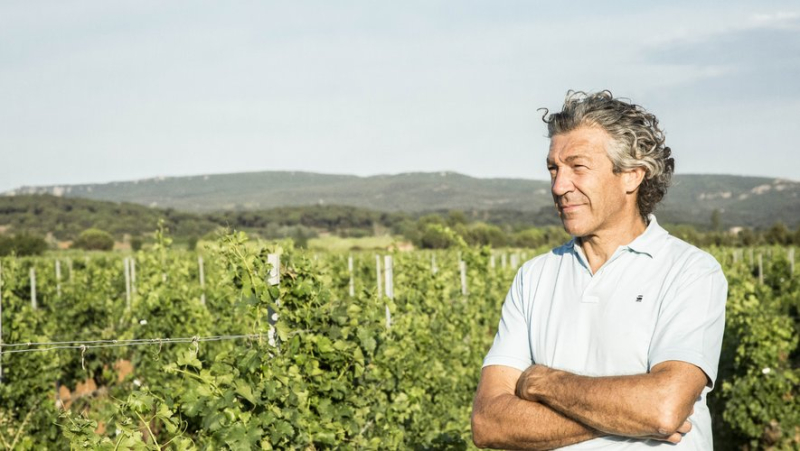“Water is the most important issue facing the region”: Gérard Bertrand discusses the crucial challenges facing viticulture

Gérard Bertrand, élu meilleur vigneron du monde l'an dernier. – Marie Ormières
Entretien avec Gérard Bertrand, l'une des principales figures viticoles françaises. Le Narbonnais, élu l'an dernier meilleur vigneron du monde par The Drink Business, évoque les enjeux auxquels fait face la filière en Occitanie.
You are today the world leader in organic and biodynamic wine, according to Le Figaro, but there is currently a lot of opposition between agriculture and viticulture with the environment, what does this inspire you ?
There has been some "bio bashing" in France, but we should not oppose agricultural methods, each has their own place and its trajectory, there are good wines in all categories.
The important thing with organic and biodynamic is that it makes it possible to stop chemical inputs, but it also brings an additional subtlety, we are looking for the local truth.
We are very sensitive to the environment, to biodiversity, so we have been following this path for twenty years and we have found a favorable response throughout the world and today the best wines in the world like Romanée-Conti, or Château Yquem are turning to this method.
We try to have living soils, this also allows us to store carbon, it is not neutral.
At a time when peasant unease is being expressed, what are the challenges for viticulture ?
The most beautiful word in the French language is the word peasant because, beyond the agricultural thing, it shapes the landscapes. But throughout the world, we see that agriculture is suffering, it is not supported enough in general by any political powers # 39;they be.
We must also adapt the models with behind the question of transformation and distribution, everyone must make an effort so that agriculture and viticulture are healthy better.
The fundamental difference is that agriculture takes a short period of time, whereas wines can travel all over the world, so we don't have everything has the same problems.
Today, viticulture is a global competition to conquer export markets, because it there is strong competition from the New World. And these are spirits, young people are drinking more and more of them (tequila, rum, cocktails…). We need to question ourselves, try to be more innovative with wine-based cocktails, wines lighter in alcohol.
On social networks, celebrities promote these spirits that come from all over the world, while we, if we want to communicate about French products, we get slapped on the wrist! The Evin law is obsolete, it needs to evolve!
We also need to put more resources on the table to promote the south of France. The acronym "Sud de France" is the best idea we have had for twenty years in this region and today we would like it' ;#39;removing it is heresy! It is the common denominator between all the appellations, all the IGPs and it is a destination known throughout the world, it is absolutely necessary to keep it.
Wines have never been as good as today in the region, this is no longer a quality problem, we must move from know-how to making people know.
Viticulture is also facing climate change, notably with the water challenge in Occitanie…
I campaign on this subject, I was a relay for the organization of the conference on water which took place on December 6 in Narbonne, because we are extraordinarily lucky in Occitanie, we have the Rhône, there are 54 billion cubic meters of water which end up in the sea each year. And we take 0.3%, that is to say 150 million.
Water is available, we must manage to transport it to all the areas in need, that is the challenge. nbsp;the most important thing that the Occitanie region must face, there is a certain level of investment to be made, to avoid the water war and ensure that it is not a limiting factor because today it impacts agriculture, viticulture , tourism, the economy and human beings in general, so if we want a prosperous region we must take 10 at a maximum of 15% of the Rhône water to meet all needs, there will always be water for biodiversity.
Here too, we must stop opposing ecology and the agricultural world, the two go hand in hand, and those who take a different view are mistaken. And it's a project that the region must support with fervor, and I'm working on it to try to also find short-term solutions for the coastal strip because' she is in great pain, the water is passing by, there are LNG tankers who will deliver her to Spain.
We need short-term solutions for 2024/2025 and above all a major 2030 plan so that water is everywhere in Occitania. And once we have sorted that out, we will have the most beautiful region, Occitanie is the Eldorado of Europe!
On the bill at Jazz à l'Hospitalet from July 16 to July 20
Gérard Bertrand organizes a festival, every summeré on his land at Château L'Hospitalet, & Narbonne, in the Clape massif. Jazz à l’Hospitalet promises to be a new and exciting vintage, in 2024. On display: July 16, Pascal Obispo ; on July 17, Roberto Fonseca; July 18, Incognito; July 19 Cali, Benabar, Nolwenn Leroy, Anne Sila & the Big Band Brass of Dominique Rieux and on July 20, Gregory Porter Practical information on the site gerard-bertrand.com
I subscribe to read more




